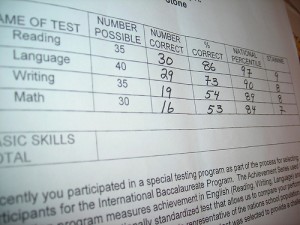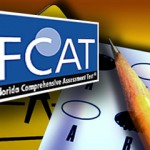New York Scores Drop On Test Tied To Common Education Standards

vampirecrazed / Flickr
New York released the first round of results for its new test tied to Common Core standards.
Educators say the percentage of students meeting state goals on Florida’s math and reading tests will decline after the state switches to new standards known as Common Core.
How bad will it be? Check out the test results released today in New York.
Just 31 percent of New York students in third through eighth grades were proficient on the new math and reading exam. Last year, 65 percent were proficient in math and 55 percent were proficient in English on different exams.
New York is one of the first states in the country to use tests aligned with the Common Core State Standards. The standards have been fully adopted by 45 states — including Florida — and the District of Columbia.
The standards ask students what they know and require them to prove how they know it. For a look at how one test under design is different from the current Florida Comprehensive Assessment Test, click here.
Despite the designers of the Common Core trying to assuage public concerns about falling scores, the Wall Street Journal reports, the scores could become a political problem.
For more than a year, New York officials have worked to prepare parents and teachers. “The principal told us ahead of time that the test was going to be a lot more rigorous,” said Lakisha Trader, a Brooklyn mother whose son attends a charter school.
In New York City, the falling test scores have presented a political problem for Mayor Michael Bloomberg, who has trumpeted rising test scores as a sign of success for his policies. Even before they were released, critics seized on the new scores, saying they would show the city hadn’t made much progress…
The lower proficiency rates don’t mean that students are doing worse, said Chad Colby, a spokesman for the Partnership for Assessment of Readiness for College and Careers, which is developing one of the two tests.
“The expectations of students have changed,” he said. “They’re actually giving an honest picture for students and parents and teachers whether or not their students are academically on track to be ready for a life after high school.”
One principal told The New York Times that lower test scores make it tougher to inspire students:
Some educators were taken aback by the steep decline and said they worried the figures would rattle the confidence of students and teachers.
Chrystina Russell, principal of Global Technology Preparatory in East Harlem, said she did not know what she would tell parents, who will receive scores for their children in late August. At her middle school, which serves a large population of students from poor families, 6.8 percent of students were rated proficient in English, and 9.5 percent in math. Last year, those numbers were 31 percent and 44 percent, respectively.
“Now we’re going to come out and tell everybody that they’ve accomplished nothing this year and we’ve been pedaling backward?” Ms. Russell said. “It’s depressing.”
We’ve written before about some of the complaints with New York’s new tests.
Florida students are likely to receive an additional year’s reprieve from the new exams. Legislative leaders want the state to withdraw from one of the national coalitions designing a new test for use in early 2015. Instead, House Speaker Will Weatherford and Senate President Don Gaetz want Florida to come up with its own plan for testing.
That could mean Florida designs its own test, uses one designed by testing firms ACT or SAT or adapts another state’s exam. But Gaetz and Weatherford don’t want to use the new test until early 2016.

